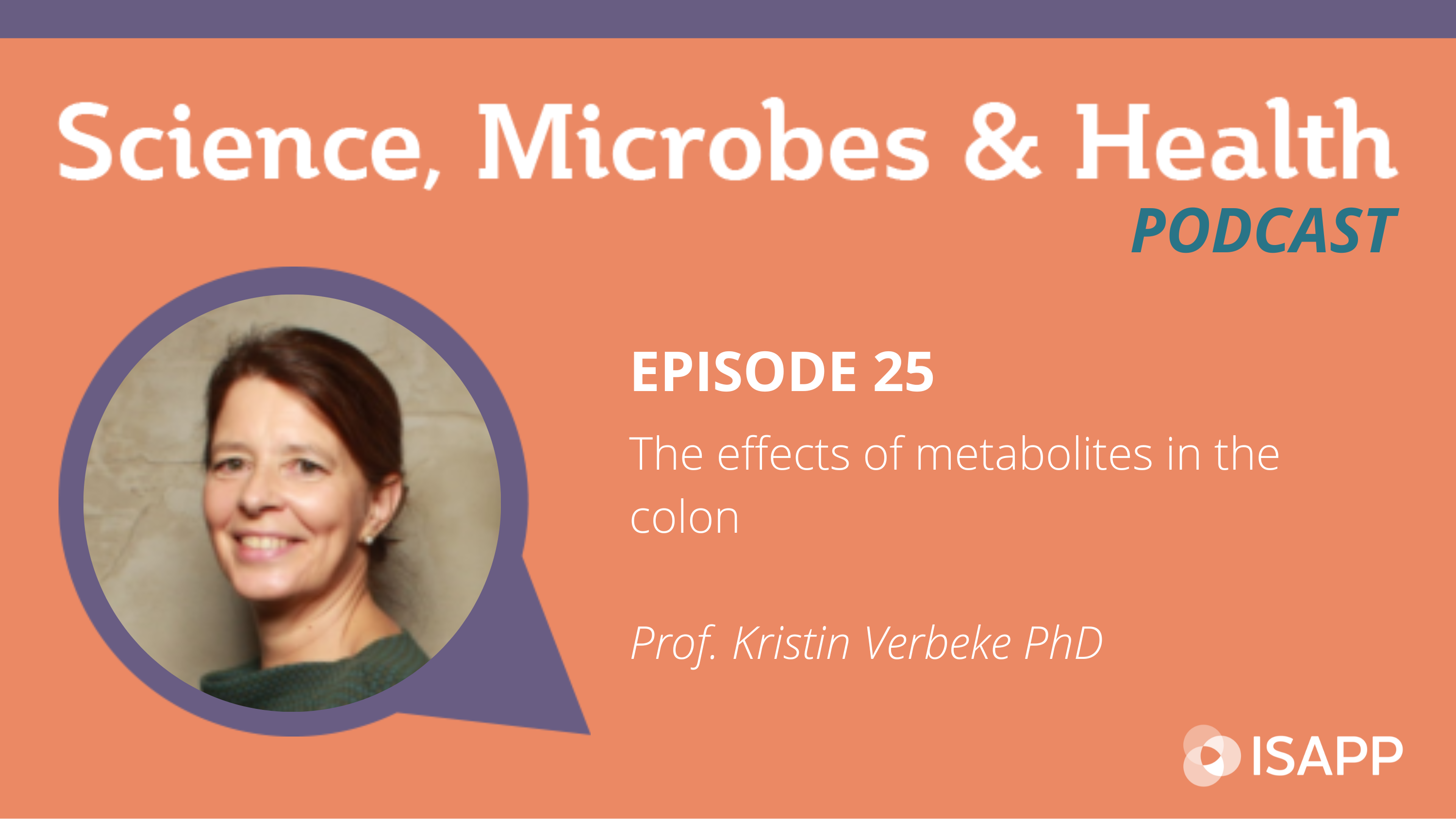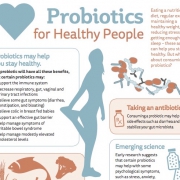Episode 25: The effects of metabolites in the colon

Podcast: Play in new window | Download
Subscribe: Apple Podcasts | Spotify | RSS
The Science, Microbes & Health Podcast
This podcast covers emerging topics and challenges in the science of probiotics, prebiotics, synbiotics, postbiotics and fermented foods. This is the podcast of The International Scientific Association for Probiotics and Prebiotics (ISAPP), a nonprofit scientific organization dedicated to advancing the science of these fields.
The effects of metabolites in the colon, with Prof. Kristin Verbeke PhD
Episode summary:
In this episode, the ISAPP podcast hosts talk about colonic metabolites with Prof. Kristin Verbeke PhD, from KU Leuven, Belgium. She talks about characterizing microbial metabolism in the colon and the consequences of producing various metabolites, both beneficial ones (such as short-chain fatty acids) and potentially detrimental ones.
Key topics from this episode:
- Prof. Verbeke is a pharmacist by training, and now leads hospital breath testing and carries out research on microbial metabolites in the gastrointestinal tract, including how prebiotics and probiotics can change bacterial metabolism.
- The majority of protein in the diet is digested in the small intestine, but about 5% of animal protein and 10-15% of plant protein reaches the large intestine to be fermented by the microbiota. This produces metabolites, which are shown in vitro to be toxic. However, in vivo there is less evidence of toxicity; the negative effects of these metabolites may be reduced by the interactions of different compounds in the colon.
- Short-chain fatty acids (SCFAs) are produced when the body digests dietary fiber, and Prof. Verbeke’s group and others are investigating whether they are responsible for the benefits of eating fiber.
- Most SCFAs are quickly absorbed in the large intestine, and they serve as an energy source for the cells. They then travel to the liver via portal circulation, where they have additional functions. What’s left over reaches systemic circulation.
- The difficulty is knowing how many SCFAs are produced in the colon, and how many reach systemic circulation. In one experiment, they labeled the SCFAs that were administered to the colon via capsule; 36% ended up in systemic circulation. Further, when SCFAs were administered at physiological doses the subjects receiving them (compared to placebo) showed a lower cortisol response to stress.
- SCFAs also affect fat oxidation and fat synthesis in the liver. Their relevance to non-alcoholic fatty liver disease are being investigated.
- It’s important to eat fiber, and lots of different types. After fiber consumption, SCFAs increase in a sustained manner and take about 8h to get back to baseline. But with SCFA delivery via capsule they spike quickly and then disappear.
- As for coatings to deliver to the colon, some coatings are time-dependent, pH dependent, etc. and this is an area for further exploration.
Episode links:
- Study on protein fermentation: Modulation of protein fermentation does not affect fecal water toxicity: a randomized cross-over study in healthy subjects
- Study on SCFAs: Systemic availability and metabolism of colonic-derived short-chain fatty acids in healthy subjects: a stable isotope study
- Review: Coated dosage forms for colon-specific drug delivery
About Prof. Kristin Verbeke PhD:
Kristin Verbeke graduated from the KU Leuven, Belgium as a pharmacist in 1991. She obtained a PhD in Pharmaceutical Sciences at the Laboratory of Radiopharmaceutical Chemistry in 1995 and subsequently spend a postdoctoral period in developing radioactively labelled compounds. In 2002, she was appointed at the department of gastroenterology of the Medical Faculty of the Leuven University where she got involved in the use of stable isotope labelled compounds to evaluate gastrointestinal functions. Within the University Hospitals Leuven, she is responsible for the clinical application of diagnostic 13C- and H2-breath tests. Her current research interest specifically addresses the microbial bacterial metabolism in the human colon. Her team has developed several analytical techniques based on mass spectrometry and stable isotope or radioisotope technologies to evaluate several aspects of intestinal metabolism and function in humans (transit time, intestinal permeability, carbohydrate fermentation, protein fermentation, metabolome analysis). Collaborative research has allowed showing an aberrant bacterial metabolism in patient groups with end stage renal failure, inflammatory bowel diseases, irritable bowel disorders and alcohol abuse. These collaborations all have resulted in high quality peer-reviewed papers. In addition, she showed the impact of dietary interventions (modulation of macronutrient composition, pre- or probiotic interventions) on the microbial metabolism and its impact on health. As a PI, she acquired grant support from the university and different funding bodies and successfully completed these projects. Similarly, she supervised several PhD projects that all resulted in the achievement of a PhD degree. Her research resulted in over 200 full research papers. Together with colleague Prof. J. Delcour, she was the beneficiary of the W.K. Kellogg Chair in Cereal Sciences and Nutrition (2010-2020). She is the president of the Belgian Nutrition Society, the vice-chair of the Leuven Food Science and Nutrition Center, and the co-chair of the Prebiotic task force at ILSI Europe. Furthermore, Kristin Verbeke is the editor of the journal Gut Microbiome and member of the editorial board of Gastrointestinal Disorders. Kristin joined the ISAPP Board of Directors in 2023.













